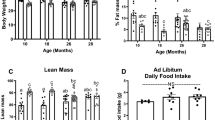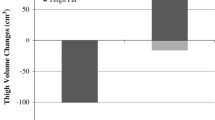Abstract
Objectives
Caloric restriction (CR) has been shown to slow the aging processes in a number of preclinical studies and reduces expression of aging-associated biomarkers in human trials. We hypothesized that CR would lead to increased incidence of ketosis and that ketosis in CR individuals would alter the aging-protective effects of CR or biomarkers thereof.
Design/Setting/Participants
We analyzed data from the “Comprehensive Assessment of Long-Term Effects of Reducing Intake of Energy (CALERIE, Phase 2)” Public Use Database available at calerie.duke.edu. In this study, non-obese adults between the ages of 21 and 50 were randomized to 25% CR or control (ad lib) diet groups and extensively monitored for two years. Given our focus on the effect of caloric restriction on ketosis, individuals with detectible ketones during the baseline visit (pre-randomization) and those with missing data for ketone testing were excluded from the analysis, leaving 71 control and 117 CR participants.
Measurements
We analyzed the incidence of ketosis as well as ketosis free survival in control and CR participants and assessed the effect of ketosis on a number of clinical lab values, functional assessments, and participant survey data related to aging biology.
Results
We report that CR was associated with modestly increased incidence of ketosis (4.4% in CR vs 1.9% in control), though CR-associated changes in T3, VO2, SUMPT-WT (weight normalized composite strength score — peak torque), physical functioning, and general health did not appear to be altered by the presence or absence of ketosis. Additional observations of interest include: 1) striking patterns of biomarker expression changes (MCP-1, TNFα, TGF-β1, GH) in both the control and CR participants between the baseline visit and the 24-month post-randomization visit and 2) pro-growth/anti-inflammatory baseline (pre-randomization) biomarker expression profile in CR individuals that later test ketone positive relative to other CR individuals.
Conclusions
CR modestly increases the incidence of ketosis in healthy adults, yet the increase in ketosis in CR patients did not significantly affect the aging-protective effects of CR. However, given the relatively small number of participants who were ketone positive, further investigation in larger study cohorts is still required for definitive conclusions.




Similar content being viewed by others
References
Franceschi C, Bonafe M, Valensin S, Olivieri F, De Luca M, Ottaviani E, De Benedictis G. Inflamm-aging. An evolutionary perspective on immunosenescence. Ann N Y Acad Sci June 2000;908:244e54.
Fontana L, Partridge L. Promoting health and longevity through diet: from model organisms to humans. Cell. 2015 Mar 26;161(1):106–18.
Fontana L, Villareal DT, Weiss EP, Racette SB, Steger-May K, Klein S, Holloszy JO; Washington University School of Medicine CALERIE Group. Calorie restriction or exercise: effects on coronary heart disease risk factors. A randomized, controlled trial. Am J Physiol Endocrinol Metab. 2007 Jul;293(1):E197–202. doi: https://doi.org/10.1152/ajpendo.00102.2007.
Heilbronn LK, de Jonge L, Frisard MI, DeLany JP, Larson-Meyer DE, Rood J, Nguyen T, Martin CK, Volaufova J, Most MM, Greenway FL, Smith SR, Deutsch WA, Williamson DA, Ravussin E; Pennington CALERIE Team. Effect of 6-month calorie restriction on biomarkers of longevity, metabolic adaptation, and oxidative stress in overweight individuals: a randomized controlled trial. JAMA. 2006 Apr 5;295(13):1539–48. doi: https://doi.org/10.1001/jama.295.13.1539.
Lefevre M, Redman LM, Heilbronn LK, Smith JV, Martin CK, Rood JC, Greenway FL, Williamson DA, Smith SR, Ravussin E; Pennington CALERIE team. Caloric restriction alone and with exercise improves CVD risk in healthy non-obese individuals. Atherosclerosis. 2009 Mar;203(1):206–13. doi: https://doi.org/10.1016/j.atherosclerosis.2008.05.036.
Racette SB, Weiss EP, Villareal DT, Arif H, Steger-May K, Schechtman KB, Fontana L, Klein S, Holloszy JO; Washington University School of Medicine CALERIE Group. One year of caloric restriction in humans: feasibility and effects on body composition and abdominal adipose tissue. J Gerontol A Biol Sci Med Sci. 2006 Sep;61(9):943–50. doi: https://doi.org/10.1093/gerona/61.9.943.
Redman LM, Heilbronn LK, Martin CK, Alfonso A, Smith SR, Ravussin E; Pennington CALERIE Team. Effect of calorie restriction with or without exercise on body composition and fat distribution. J Clin Endocrinol Metab. 2007 Mar;92(3):865–72. doi: https://doi.org/10.1210/jc.2006-2184.
Weiss EP, Racette SB, Villareal DT, Fontana L, Steger-May K, Schechtman KB, Klein S, Holloszy JO; Washington University School of Medicine CALERIE Group. Improvements in glucose tolerance and insulin action induced by increasing energy expenditure or decreasing energy intake: a randomized controlled trial. Am J Clin Nutr. 2006 Nov;84(5):1033–42. doi: https://doi.org/10.1093/ajcn/84.5.1033.
Edwards IJ, Rudel LL, Terry JG, Kemnitz JW, Weindruch R, Zaccaro DJ, Cefalu WT. Caloric restriction lowers plasma lipoprotein (a) in male but not female rhesus monkeys. Exp Gerontol. 2001 Aug;36(8):1413–8. doi: https://doi.org/10.1016/s0531-5565(01)00107-3.
Gresl TA, Colman RJ, Roecker EB, Havighurst TC, Huang Z, Allison DB, Bergman RN, Kemnitz JW. Dietary restriction and glucose regulation in aging rhesus monkeys: a follow-up report at 8.5 yr. Am J Physiol Endocrinol Metab. 2001 Oct;281(4):E757–65. doi: https://doi.org/10.1152/ajpendo.2001.281.4.E757.
Rezzi S, Martin FP, Shanmuganayagam D, Colman RJ, Nicholson JK, Weindruch R. Metabolic shifts due to long-term caloric restriction revealed in nonhuman primates. Exp Gerontol. 2009 May;44(5):356–62. doi: https://doi.org/10.1016/j.exger.2009.02.008.
Yamada Y, Colman RJ, Kemnitz JW, Baum ST, Anderson RM, Weindruch R, Schoeller DA. Long-term calorie restriction decreases metabolic cost of movement and prevents decrease of physical activity during aging in rhesus monkeys. Exp Gerontol. 2013 Nov;48(11):1226–35. doi: https://doi.org/10.1016/j.exger.2013.08.002.
Mattison JA, Colman RJ, Beasley TM, Allison DB, Kemnitz JW, Roth GS, Ingram DK, Weindruch R, de Cabo R, Anderson RM. Caloric restriction improves health and survival of rhesus monkeys. Nat Commun. 2017 Jan 17;8:14063. doi: https://doi.org/10.1038/ncomms14063.
Meydani SN, Das SK, Pieper CF, Lewis MR, Klein S, Dixit VD, Gupta AK, Villareal DT, Bhapkar M, Huang M, Fuss PJ, Roberts SB, Holloszy JO, Fontana L. Long-term moderate calorie restriction inhibits inflammation without impairing cell-mediated immunity: a randomized controlled trial in non-obese humans. Aging (Albany NY). 2016 Jul;8(7):1416–31. doi: https://doi.org/10.18632/aging.100994.
Roberts MN, Wallace MA, Tomilov AA, Zhou Z, Marcotte GR, Tran D, Perez G, Gutierrez-Casado E, Koike S, Knotts TA, Imai DM, Griffey SM, Kim K, Hagopian K, McMackin MZ, Haj FG, Baar K, Cortopassi GA, Ramsey JJ, Lopez-Dominguez JA. A Ketogenic Diet Extends Longevity and Healthspan in Adult Mice. Cell Metab. 2017 Sep 5;26(3):539–546.e5. doi: https://doi.org/10.1016/j.cmet.2017.08.005.
Newman JC, Covarrubias AJ, Zhao M, Yu X, Gut P, Ng CP, Huang Y, Haldar S, Verdin E. Ketogenic Diet Reduces Midlife Mortality and Improves Memory in Aging Mice. Cell Metab. 2017 Sep 5;26(3):547–557.e8. doi: https://doi.org/10.1016/j.cmet.2017.08.004.
Yang X, Cheng B. Neuroprotective and anti-inflammatory activities of ketogenic diet on MPTP-induced neurotoxicity. J Mol Neurosci. 2010 Oct;42(2):145–53. doi: https://doi.org/10.1007/s12031-010-9336-y.
Dupuis N, Curatolo N, Benoist JF, Auvin S. Ketogenic diet exhibits anti-inflammatory properties. Epilepsia. 2015 Jul;56(7):e95–8. doi: https://doi.org/10.1111/epi.13038.
Rosenbaum M, Hall KD, Guo J, Ravussin E, Mayer LS, Reitman ML, Smith SR, Walsh BT, Leibel RL. Glucose and Lipid Homeostasis and Inflammation in Humans Following an Isocaloric Ketogenic Diet. Obesity (Silver Spring). 2019 Jun;27(6):971–981. doi: https://doi.org/10.1002/oby.22468.
Yarar-Fisher C, Kulkarni A, Li J, Farley P, Renfro C, Aslam H, Bosarge P, Wilson L, Barnes S. Evaluation of a ketogenic diet for improvement of neurological recovery in individuals with acute spinal cord injury: a pilot, randomized safety and feasibility trial. Spinal Cord Ser Cases. 2018 Sep 21;4:88. doi: https://doi.org/10.1038/s41394-018-0121-4.
Poff A, Koutnik AP, Egan KM, Sahebjam S, D’Agostino D, Kumar NB. Targeting the Warburg effect for cancer treatment: Ketogenic diets for management of glioma. Semin Cancer Biol. 2019 Jun;56:135–148. doi: https://doi.org/10.1016/j.semcancer.2017.12.011.
Mihaylova MM and Stratton MS (2019) Short chain fatty acids as epigenetic and metabolic regulators of neurocognitive health and disease. In: Ferguson BS (ed) Nutritional Epigenomics, Vol 14 in Translational Epigenetics. 2019. Elsevier Inc, Chapter 23, pp 381–397
Ravussin E, Redman LM, Rochon J, Das SK, Fontana L, Kraus WE, Romashkan S, Williamson DA, Meydani SN, Villareal DT, Smith SR, Stein RI, Scott TM, Stewart TM, Saltzman E, Klein S, Bhapkar M, Martin CK, Gilhooly CH, Holloszy JO, Hadley EC, Roberts SB; CALERIE Study Group. A 2-Year Randomized Controlled Trial of Human Caloric Restriction: Feasibility and Effects on Predictors of Health Span and Longevity. J Gerontol A Biol Sci Med Sci. 2015 Sep;70(9):1097–104. doi: https://doi.org/10.1093/gerona/glv057.
Das SK, Roberts SB, Bhapkar MV, Villareal DT, Fontana L, Martin CK, Racette SB, Fuss PJ, Kraus WE, Wong WW, Saltzman E, Pieper CF, Fielding RA, Schwartz AV, Ravussin E, Redman LM; CALERIE-2 Study Group. Body-composition changes in the Comprehensive Assessment of Long-term Effects of Reducing Intake of Energy (CALERIE)-2 study: a 2-y randomized controlled trial of calorie restriction in nonobese humans. Am J Clin Nutr. 2017 Apr;105(4):913–927. doi: https://doi.org/10.3945/ajcn.116.137232.
Kraus WE, Bhapkar M, Huffman KM, Pieper CF, Krupa Das S, Redman LM, Villareal DT, Rochon J, Roberts SB, Ravussin E, Holloszy JO, Fontana L; CALERIE Investigators. 2 years of calorie restriction and cardiometabolic risk (CALERIE): exploratory outcomes of a multicentre, phase 2, randomised controlled trial. Lancet Diabetes Endocrinol. 2019 Sep;7(9):673–683. doi: https://doi.org/10.1016/S2213-8587(19)30151-2.
Racette SB, Rochon J, Uhrich ML, Villareal DT, Das SK, Fontana L, Bhapkar M, Martin CK, Redman LM, Fuss PJ, Roberts SB. Effects of two years of calorie restriction on aerobic capacity and muscle strength. Medicine and science in sports and exercise. 2017 Nov;49(11):2240.
Huffman KM, Parker DC, Bhapkar M, Racette SB, Martin CK, Redman LM, Das SK, Connelly MA, Pieper CF, Orenduff M, Ross LM, Ramaker ME, Dorling JL, Rosen CJ, Shalaurova I, Otvos JD, Kraus VB, Kraus WE; CALERIE™ Investigators. Calorie restriction improves lipid-related emerging cardiometabolic risk factors in healthy adults without obesity: Distinct influences of BMI and sex from CALERIE™ a multicentre, phase 2, randomised controlled trial. EClinicalMedicine. 2022 Jan 3;43:101261. doi: https://doi.org/10.1016/j.eclinm.2021.101261.
Apostolopoulos V, De Courten MP, Stojanovska L, Blatch GL, Tangalakis K, De Courten B. The complex immunological and inflammatory network of adipose tissue in obesity. Molecular nutrition & food research. 2016 Jan;60(1):43–57.
Hanna A, Frangogiannis NG. The Role of the TGF-β Superfamily in Myocardial Infarction. Front Cardiovasc Med. 2019 Sep 18;6:140. doi: https://doi.org/10.3389/fcvm.2019.00140.
Colon G, Saccon T, Schneider A, Cavalcante MB, Huffman DM, Berryman D, List E, Ikeno Y, Musi N, Bartke A, Kopchick J, Kirkland JL, Tchkonia T, Masternak MM. The enigmatic role of growth hormone in age-related diseases, cognition, and longevity. Geroscience. 2019 Dec;41(6):759–774. doi: https://doi.org/10.1007/s11357-019-00096-w.
Pioli MR, Ritter AM, de Faria AP, Modolo R. White coat syndrome and its variations: differences and clinical impact. Integr Blood Press Control. 2018 Nov 8;11:73–79. doi: https://doi.org/10.2147/IBPC.S152761.
Acknowledgements
MS was supported by NIH AG056848, AHA 857280 and a local CCTS Voucher from CTSA RUL1TR02733 to fund biostatistics analysis by the OSU Center for Biostatistics. USDA NIFA Hatch-NEV00727, NEV00767, the Dennis Meiss & Janet Ralston Fund for Nutri-epigenetic Research, NIH P20 GM130459 and R15 HL143496, and NSF EPSCOR Track II (OIA-1826801) supported BSF.
Author information
Authors and Affiliations
Corresponding author
Ethics declarations
Conflicts of Interest: The authors declare that no financial conflicts of interest exist.
Ethics Standards: The work in this manuscript complies with the current laws of the USA.
Electronic supplementary material
Supplemental Table 1.
Statistical testing of select CALERIE endpoints.
Rights and permissions
About this article
Cite this article
Ferguson, B.S., Sahoo, P., McGrail, E. et al. Modestly Increased Incidence of Ketosis in Caloric Restriction Does not Significantly Alter the Effects of Caloric Restriction. J Nutr Health Aging 26, 657–662 (2022). https://doi.org/10.1007/s12603-022-1815-7
Received:
Accepted:
Published:
Issue Date:
DOI: https://doi.org/10.1007/s12603-022-1815-7




